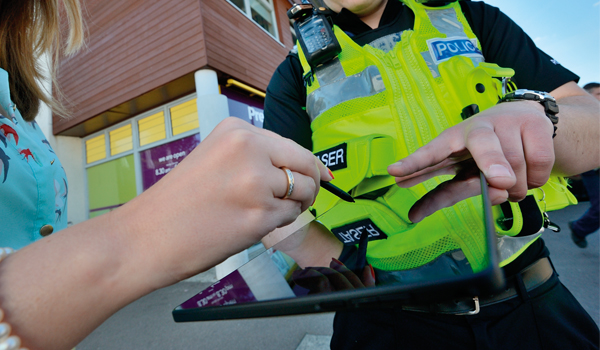The real ROI of digital technology
With transformation through technology top of the agenda this week with the second Police ICT Summit being hosted in Leicestershire, one of the inevitable questions will be: What is the ROI (return on investment)?
With transformation through technology top of the agenda this week with the second Police ICT Summit being hosted in Leicestershire, one of the inevitable questions will be: What is the ROI (return on investment)?
Invest in the latest digital policing technology and you will save time and money, your officers will be happier and more productive, and you will be able to cope better with the constant pressure to do more with less it is a mantra that has been heard time and again says Jamie Wilson, who is responsible for public safety marketing for NICE Systems throughout EMEA.
The big problem is that while there is much truth to such claims, they need to be backed up by hard facts in order to have any real credibility, he explained in his public safety blog.
Mr Wilson says two questions that need to be asked are: What is the cost of doing nothing or doing things the way we have always done? and What savings do I get if I do change?
I was very interested to read about the approach that Thames Valley Police has taken, in an article published in The Reading Chronicle. In the report, Chief Constable Francis Habgood talked about several shrewd initiatives that have been introduced, such as the use of smartphones that enable officers to take the office out on the streets rather than doing all of their work back at the station, said Mr Wilson.
He also explained how they have closed front counters at a number of stations (saving more than half a million pounds), paving the way for using digital technology to interact with the public. The force had surveyed 10,000 people asking for their attitude to reporting non-urgent cases, and one in ten stated that they would be more comfortable with this approach.
That may not seem very high, but scale it up and it could mean that they would be handling 10,000 fewer calls out of every 100,000. And if you have 10,000 fewer calls you naturally need less calling-taking resources and fewer staff, which translates into pretty substantial cost savings.
Mr Wilson also highlighted the example of Cambridgeshire Constabulary, which is trialling the use of Skype for post-incident interviews with victims of certain types of crime.
Other forces have embraced digital channels as a way for victims of crime to share evidence that would historically have been collected by an officer, he added. Again, it is relatively easy to calculate the cost savings from officers not having to be in transit (hourly rate of the officer x number of hours on the road). And if you want to get really into the detail, add in the cost of the fuel used for these trips, plus depreciation and wear and tear on vehicles.
Mr Wilson says by taking an analytical and tactical approach there are many areas where the shrewd use of digital policing technology can reap substantial and demonstrable savings
Of course, one of the key challenges is to know where you should start looking, he added.
William Mosseri-Marlio, a researcher at the think-tank Reform, says few doubt digitisation can be an agent of reform be it through driving efficiencies, helping to tackle cybercrime or forging a new relationship between officers and citizens.
Yet the police are not renowned for digital adoption, he said in his paper, Analytics and algorithms: the future of policing?
And a report by Her Majesty`s Inspectorate of Constabulary found IT capability was weak and ageing.
Tactical procurement practices are partly to blame forces have tended to purchase tools in isolation, as kit, rather than as an enabler of better outcomes. The resultant estate is complex and difficult to unpick.
Henry Rex, programme manager for justice and emergency services at industry body techUK, says great strides have been made through initiatives such as the Digital Policing Board and the Police Transformation Fund, but police must work with government and industry to ensure they are best-placed to take advantage of innovative technology.
Speaking ahead of the Police ICT Summit, Ian Dyson, C





